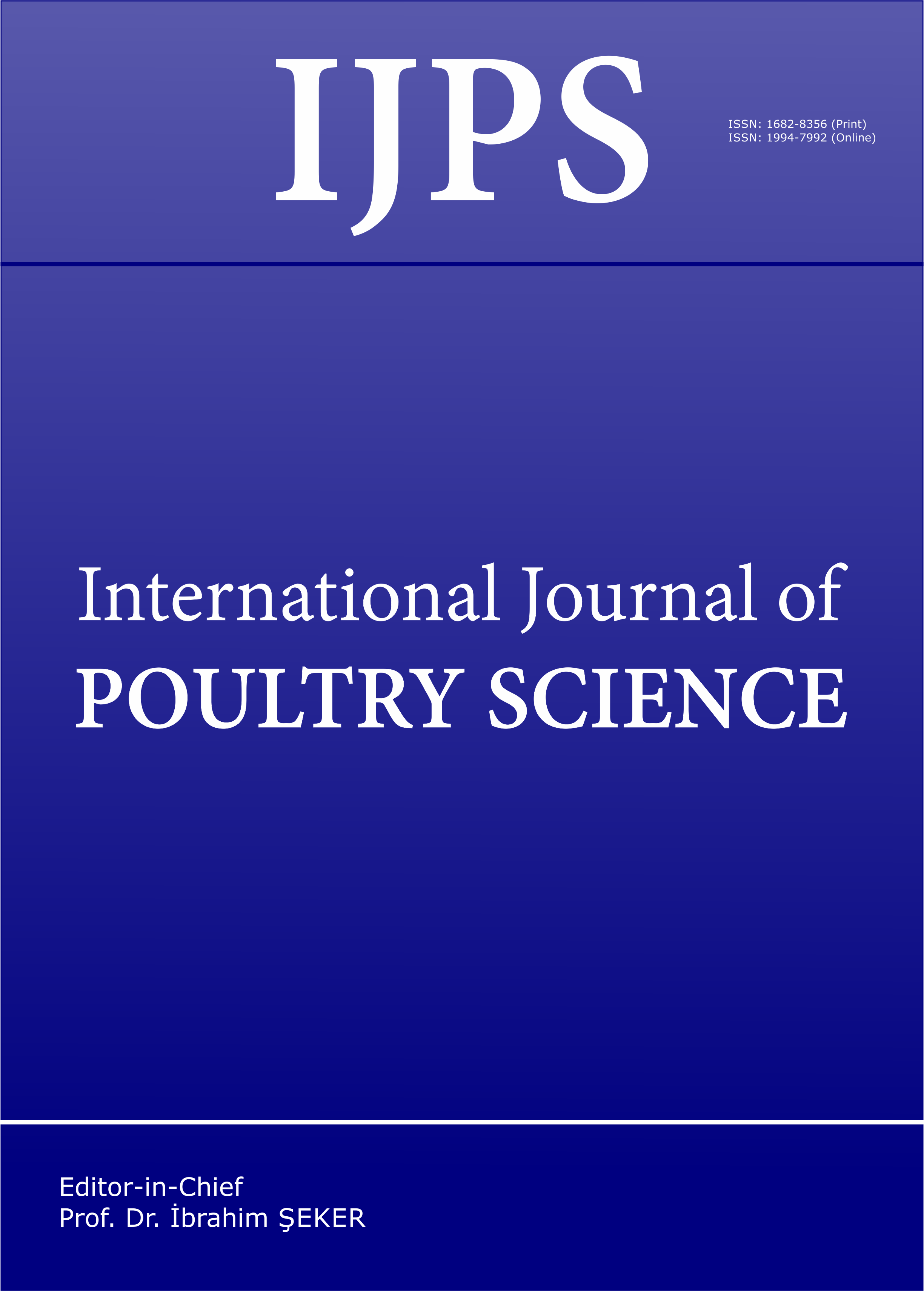Effect of Andrographis paniculata a Phytobiotic on Consumption, Feed Conversion and Mojosari Duck Egg Production
DOI:
https://doi.org/10.3923/ijps.2015.529.532Keywords:
Andrographis paniculata leaf powder, mojosari duck (Mojosari anas plathryncos), phytobioticsAbstract
The aim of this research was to investigate the effect of Andrographis paniculata leaf powder as a phytobiotic on feed consumption, feed conversion and egg production of the Mojosari duck (Mojosari anas plathryncos). One-hundred 24-month-old Mojosari ducks were given basal feed with different concentrations of Andrographis paniculata leaf powder as a feed additive. Experiments were arranged with a completely random design, with five leaf powder concentrations, each replicated four times; A. paniculata leaf powder was added to rations in the following concentrations: 0% (P0), 0.2% (P1), 0.4% (P2), 0.6% (P3) and 0.8% (P4). Data was analyzed using analysis variants and if there was a difference between treatments, those data were further subjected to a least significant difference test; variables included feed consumption, daily egg production and feed conversion. Results showed that A. paniculata leaf powder significantly affected (p<0.05) feed conversion and egg production of Mojosari ducks. However, A. paniculata leaf powder had no significant effect (p>0.05) on feed consumption. Average feed consumption per treatment (P0, P1, P2, P3, or P4) was 136.77, 137.82, 135.8, 139.47 and 138.97 g/bird/d, respectively. Average feed conversion values were 9.35 (P0), 5.92 (P1), 4.93 (P2), 7.01 (P3) and 13.50 (P4) and average egg production percentage per treatment was 23.18% for P0, 33.73% for P1, 42.22% for P2, 28.25% for P3 and 14.61% for P4. It was concluded that 0.4% A. paniculata leaf powder was optimal for its phytobiotic actions on Mojosari ducks.
References
Alamsari, O.S., S.U. Handayani and U. dan Cahyaningsih, 2001. Effect of Using Zingiber aromaticum Val. Extract on Chicken Eimeria spp. Oocysts Production. Persada Bogor, Indonesia.
Chowdhury, A., S.K. Biswas, S.Z. Raihan, J. Das and S. Paul, 2012. Pharmacological potentials of Andrographis paniculata: An overview. Int. J. Pharmacol., 8: 6-9.
Guther, K.D. and M. Ulfah, 2003. Influence of natural essential oils on digestion, metabolism and efficient production. Proceedings of the 4th Buffalo Symposium, February 25-28, 2003, New Delhi, India.
Davoodi, H. and S.R. Hashemi, 2010. Phytogenics as new class of feed additive in poultry industry. J. Anim. Vet. Adv., 9: 2295-2304.
Hy-Line International, 1986. Hy-Line Variety Brown: Commercial Management Guide. Publication of Hy-Line International, West Des Moines, Iowa.
JETACAR., 1999. The use of antibiotics in food producing animals : Antibiotic-resistant bacteria in animal and humans. Report of the Joint Expert Advisory Committee on Antibiotic Resistance Advisory Committee On Antibiotic Resistance, Commonwealth Department of Health and Aged Care, Commonwealth Department of Agiculture, Fisheries and Forestry, Australia.
Ketaren, P.P., 2007. Duck's as national egg and meat producer. Wartazoa, 17: 117-127.
Roopavathy, J., P. Krishnamoorthy, M. Sukumaran and K. Rajeswari, 2011. Effect of Andrographis paniculata leaves extract on ovary of adult Ornamental fish-black molly (Mollienisia latipinna). Adv. Applied Sci. Res., 2: 314-319.
Sinurat, A.P., 2000. Local chicken and duck feed formulation. Trainning Project of Agribisnis Animal Husbandry Development, Department of Animal Husbandry DKI Jakarta, Indonesia, June 20, 2000.
Soeharsono, H., L. Adriani, R. Safitri, O. Sjofjan and S. Abdullah et al., 2010. Probiotic, Basic Scientific, Aplication, Practical Aspect. Widya Padjadjaran, Bandung, Indonesia.
Tipakorn, N., 2002. Effect of Andrographis paniculata (Burm F.) nees on performance, mortality and coccidiosis in broiler chickens. Ph.D. Thesis, University of Gottingen, Gottingen, Germany.
Toghyani, M., M. Toghyani, M. Mohammadrezaei, A. Gheisari, S.A. Tabeidian and G. Ghalamkari, 2011. Effect of cocoa and thyme powder alone or in combination on humoral immunity and serum biochemical metabolites of broiler chicks. Proceedings of the 2nd International Conference on Agricultural and Animal Science, Volume 22, November 25-27, 2011, Singapore, pp: 114-118.
Ulfah, M., 2006. Herbals potential as multi fuctional phytobiotic to increase wild animal health and performance on animal preservation. Conserv. Media, 9: 109-114.
Varel, V.H., 2002. Carvacrol and thymol reduce swine waste odor and pathogens: Stability of oils. Curr. Microbiol., 44: 38-43.
Downloads
Published
Issue
Section
License
Copyright (c) 2015 Asian Network for Scientific Information

This work is licensed under a Creative Commons Attribution 4.0 International License.
This is an open access article distributed under the terms of the Creative Commons Attribution License, which permits unrestricted use, distribution and reproduction in any medium, provided the original author and source are credited.

